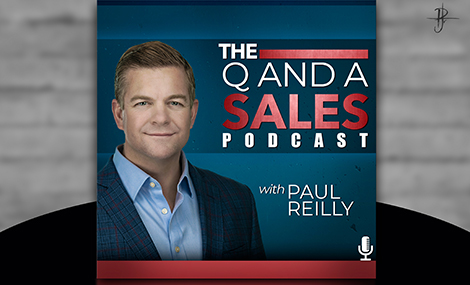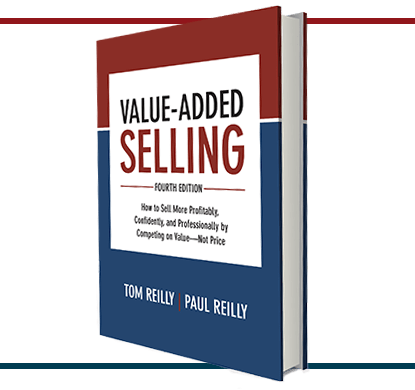On this episode, Paul provides impactful insight into the idea of aggressive pricing.
Show Notes:
“The greatest impact [of aggressive pricing] is on the ….”
“Every dollar you discount is pure profit you’re leaving on the table.”
Don’t set a discounting precedent.
The more you do it, the easier it is. Don’t become addicted to discounting!
Click here to purchase the latest edition of Value-Added Selling!
Thanks to our production team at The Creative Impostor Studios!
Click here to book a complimentary consultation with Strategist and Producer, Andrea Klunder, to find out how to launch, produce, and grow your company’s podcast.
***
Thank you for tuning in. Our show is updated weekly with the questions you ask. So, please go to the home page to ask the question that you want answered.
Be sure to follow our show in your favorite podcast app and share this episode with a colleague or friend.
And most importantly, you know what to do…make it a big day.
What is the impact of aggressive pricing?
(Transcribed from podcast)
Today we have another question coming in from the website. So that is a reminder. Make sure you visit the QandASalesPodcast.com. There, you can ask me a question and I will turn it into a future show just like I am doing today.
Today’s question comes from John. John and I have actually done a little bit of work together, and John is selling in the machine tool industry. He’s a CNC manufacturer. And he’s curious about pricing. Pricing, obviously, is an important topic in any business because pricing drives profitability. But here’s John’s question. John wants to know, “Paul, what happens when a salesperson says that they are getting aggressive with pricing?” So we’re going to talk about the impact. I’m going to broaden that question a little bit and use it this way, “What’s the impact of aggressive pricing from salespeople?” So that’s the question we’re going to ask today.
Before we get into that, though, shout-out to Andrea over The Creative Impostor Studios. We are getting very close to almost being downloaded in 70 countries, which goes to show you there’s a strong need for this message. People have questions they want answered. And you know, a lot of the credit goes to Andrea and her team, you know, making sure that the tech is set up correctly, offering advice, giving us feedback. And Andrea does a wonderful job. So if you’re thinking of starting a podcast, if you have a podcast already and you’re looking to make a change, reach out to Andrea and her team over at The Creative Impostor Studios. We are going to have a link to her website on this episode’s webpage.
Also, make sure you pick up your latest copy of Value-Added Selling. In fact, there’s a whole section, John, in this book, on how pricing impacts profitability. I’m going to share just a few tidbits with you there. But this is a great question and I’m excited to dive right into it. So let’s get back to it.
What’s the impact of aggressive pricing? Several years ago, I read an article—it’s timeless, it’s back from the early nineties—it appeared in the Harvard Business Review. The title is “Managing Price, Gaining Profit.” It’s a wonderful article. We’ll have a link to it in the transcription for the podcast. In the article, they claim that if you are a company with average economy as a scale, a simple 1% price increase will increase your operating profit by 11.1%. Now, the inverse is also true. They go on to say in the article, a 1% discount will decrease your operating profit by 11.1%. That’s the power of 1%. And so, the first thing I wanted to mention when it comes to profitability and what’s the impact of aggressive pricing, the greatest impact is on the profitability of your company.
Sometimes as salespeople, we think, ‘Oh, it’s just 1% here, 2% here. It’s just a couple of grand here on this deal.’ You have to remember that every dollar you discount is pure profit that you are leaving on the table. Remember that every dollar that you discount, every percentage point, whatever it may be, that is pure profit leaving your company. We have to remember that, that when it comes to discounting, when it comes to making that decision, we almost need to take it out of the salesperson’s hands completely. And the reason why, salespeople are too close to the deal. They’re too emotional.
There’s a great article. Warren Buffett was talking about why managers—frontline managers—should not have pricing authority. And he said, “…because they’re too close to the deal. If they raise the price and they end up losing the business, they’ve screwed up the only thing they have going on in their life.” And he said, “But if I am able to raise prices at a higher level within the organization, I can balance it out with other deals that I’m working on.”
And he was basically saying that if you’re too close to the deal, the closer you are to the deal rather, the less control over pricing you should have. And I think that’s a great tip and idea is just keep pricing authority away from salespeople because every dollar discount is pure profit leaving the company. The first thing, again, is just remember, pricing equals profitability. For every dollar discount, that’s a dollar leaving your organization. That’s the impact.
The other impact there that we don’t think about is the precedent that we are setting. As salespeople, when you are discounting, just remember—it could be the end of the month, end of the quarter, end of the year, whatever it may be—you are setting a discounting precedent. And that means that for every discount you give today, you are establishing a discounting precedent for the future. So yeah, you do this one time to get the deal, but then the next time you have a deal coming around, they’re going to look at the invoicing; they’re going to look at the proposal; they’re going to look at the discounting and they’re going to demand it. And they’re going to expect you to deliver that same discount as before. That’s the other danger there is that we’re setting a discounting precedent.
I remember, I was flying into Chattanooga’s airport and I went to my primary rental car company, which I won’t mention their name because I’m going to bash them a little bit. I get there and it’s the last flight in in the evening. Chattanooga is a pretty small airport anyway, but I get there, and they don’t have my rental car. I had the reservation, I had everything, I had the paperwork, they said, “I’m sorry. We just don’t have any rental cars.” They said, “Why don’t you go over to Hertz? Hertz has some cars left.”
So I get over there. There’s three people in line. I’m thinking the worst. I’m thinking, “Okay. They’ve only got two cars left. I’m going to be the third person. I won’t get it.” But thankfully I get there, guy said, “We’ve got great news. We have one car left.” Now, the one car they had left happened to be like the luxury version which I never get that when I’m renting a car, right. I’m practical. He said, “I’m sorry, but this is the only one we have left. It’s going to be $250 per night for the rental, all that.” I said, “That’s fine. I’ll take it.” But as he was— (here’s what’s crazy), as I’m handing over my credit card to get the rental—because the price didn’t matter. I had to get the rental car. I had to drive another hour anyway into Georgia—but as I hand him over my credit card, he says, “You know what? We, as managers, we can do a manager special every now and then. I’m going to knock $50 off your rental.” And I said, “Oh great. Thanks. I appreciate it.”
He gave me a discount. You might be thinking, “Oh, well, Paul. That was nice. It’s going to drive loyalty and all that.” No. That drives an expectation. What would drive loyalty is the fact that they came through and had a vehicle when I needed it. And that’s what ultimately led me switching over to Hertz is that they were able to take care of me. But now, whenever I rent from Hertz, I always ask them, “Hey, [have] you got the manager special? Can you knock off 50 or whatever it may be?” More times than not, I get it. And it’s because I had that precedent that was established, that discounting precedent was established. So, just remember that, that’s one of the other impacts of discounting is that it sets a discounting precedent.
The final idea, something to think about the impact of discounting. Discounting becomes— becomes like a drug. We become addicted to it as salespeople. Once we realize that, you know, we push so hard to win a deal, to win over a prospect, and then when it gets towards the finish line, customer says, “Hey, can you discount?” Or “Can you get a little more aggressive on pricing?” Once we start to discount, we end up becoming addicted to it because we realize just how easy it is to win deals if we could just knock off 5% here, 10% here, whatever it may be. As soon as we start doing that, that sets a new mental precedent within ourselves where we realize, ‘Okay, I’m just going to start using discounting because it’s much easier.”
It’s a slippery slope. It’s like when you’re on a diet—you’re on a diet or weight-loss program. As soon as you order that pizza, it becomes easier to stop by McDonald’s the next day for breakfast. Or as soon as you miss one workout, it’s easier to skip the next one. You have to remember that holding the line on price is something that we must do constantly. It’s a constant battle. It is a constant battle, and we have to maintain that mental strength to do it. And every time that we don’t, it becomes a little bit easier to discount more and more. So it establishes a difficult mindset to break.
Make it a big day.


